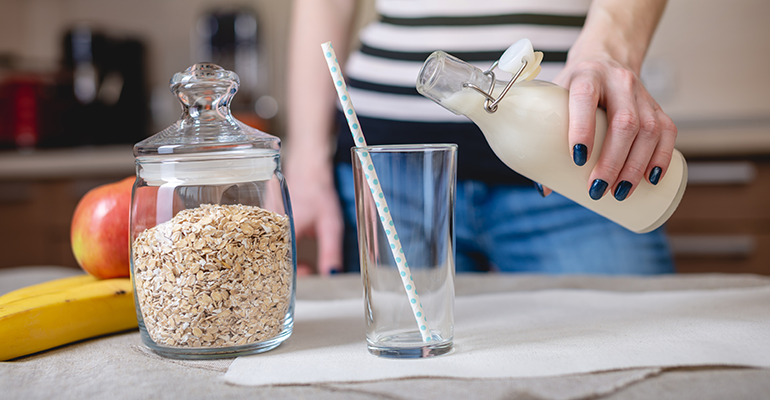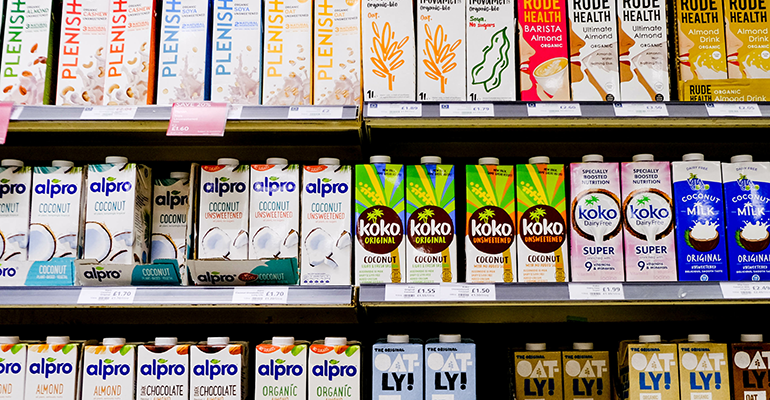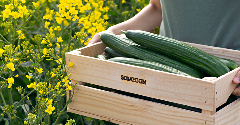News
MOMA partners with UK university to optimise oat milk
10 Feb 2023
Oat milk brand MOMA Foods is optimising the ingredients in its oat milk and improving sustainability in a co-funded project with the UK’s Teesside University.
Oats have become a popular ingredient in plant-based dairy products over recent years with their use growing by 18% and 11% in plant-based milk drinks, plant-based ice cream and frozen yoghurt respectively, from 2018 to 2022, according to Mintel.

MOMA Foods has grown rapidly since its foundation in 2006 and launched its first range of oat milk in 2020, following a Knowledge Transfer Partnership (KTP) with Portsmouth and Teesside universities.
Building on its previous success, MOMA recently announced that it will support the funding of a PhD studentship at Teesside, working alongside professor John S. Young from the National Horizons Centre, the national centre of excellence for bioscience at the university.
Improving oat milk through science
The project aims to develop novel methods of testing the quality of oat milk onsite by creating a new monitoring tool, which will analyse fat and protein content. It will also involve working with suppliers to optimize ingredients and explore approaches to creating new strains of enzymes to break down oats.
“It’s vitally important that we bring academic knowledge into the industry and don’t operate in a silo and working with Teesside University will help us to achieve this,” said Tom Mercer, founder of MOMA Foods.
MOMA’s oat milk range was initially developed with the support of Portsmouth and Teesside University academics who worked to refine the ingredients and ensure the right combination of enzymes were being used to break down the starch in the oats. This resulted in a foamable product that did not split when added to hot liquid.
The results of this partnership have been significant, with oat milk overtaking porridge as MOMA’s best-selling product. The milk has received several awards, including a Great Taste Award, and is stocked at a range of key retailers in the UK including Tesco, Waitrose, and Sainsbury’s.
A sustainable solution to traditional dairy
Traditional milk production accounts for around 2.2% of global greenhouse gas emissions. Oat milk, which can contribute to reducing greenhouse gas emissions by reducing methane production from cows, offers a sustainable alternative to traditional dairy milk.
“At Teesside University, a key pillar of our research strategy is forging a smarter, greener economy through novel and disruptive technologies. Our ongoing relationship with MOMA has already delivered real impact by helping the company develop an innovative product that is not only creating jobs and new markets for the business but could have a real impact in reducing global emissions,” said professor John S. Young.
Addressing the call for reduced-sugar alternatives
Where sustainability is concerned, oat milk significantly outperforms traditional milk. One study found that oat milk production requires 60% less energy, 80% fewer greenhouse gas emissions, and 80% less land than cow milk.
 © AdobeStock/Martin Lee
© AdobeStock/Martin Lee
Yet questions have been raised as to the healthiness of oat alternative products. While most unsweetened (no added sugar) oat milk brands contain less sugar than traditional milk, the claim that they are sugar-free is oftentimes misleading. Oatly Original contains around 7 g of sugar per serving, compared to Silk Oat Yeah, Planet Oat, and Quaker Oat Beverage which contain 5 g, 4 g, and 0 g respectively.
Often, these naturally occurring sugars are the result of the enzymatic process that occurs when oat starch is broken down after being mixed with water to create the oat milk base. According to guidance issued by the US Food and Drug Administration (FDA) in 2018, sugars created through processes such as hydrolysis should be declared as added sugars on product labels.
MOMA is yet to confirm whether the project will also seek to reduce the sugar content and boost the healthiness of their oat milk.
Related news

Soy story: WWF scores UK supermarkets on sustainability efforts
12 Nov 2025
WWF has published its latest “Soy Scorecard”, ranking UK supermarkets’ efforts to combat deforestation and land conversion in their soy supply chains.
Read more
Standing Ovation and Bel scale up casein production from dairy co-products
11 Nov 2025
Foodtech company Standing Ovation has partnered with cheese specialist Bel Group to manufacture dairy serums for industrial-scale casein production via precision fermentation.
Read more
New UPF standard hoped to offer consumers ‘coherence and clarity’
10 Nov 2025
Ingredients companies are being urged to enter “a new era of partnership and innovation” following the launch of the industry’s first non-UPF verification scheme.
Read more
Whistleblowers accuse UK meat industry of promoting cheap, unsustainable supply
7 Nov 2025
An anonymous group of industry insiders has accused the UK’s biggest food companies of systematically driving down meat quality and welfare standards.
Read more
Bord Bia presents Irish dairy ingredient suppliers at Fi Europe
6 Nov 2025
Dairygold Co-operative Society, The Carbery Group, and Ornua Co-operative: Meet with sustainable producers of Irish dairy ingredients at Food ingredients Europe 2025, Hall 7.2 Stand M18.
Read more
AI attraction means foodtech startups must ‘prove’ rather than ‘promise’
4 Nov 2025
Reports suggest that artificial intelligence (AI) is sucking investment from foodtech and agritech, but investors say the picture is complicated.
Read more
Penguin and Club bars no longer classed as chocolate
30 Oct 2025
Penguin and Club bars can no longer be classified as chocolate after the pladis-owned McVitie’s brands turned to cheaper alternatives amid the ongoing cocoa crisis.
Read more
Could plant-based protection replace plastic packaging?
29 Oct 2025
Swedish foodtech company Saveggy has launched an additive-free plant-based protection for cucumbers, offering a waste-free packaging solution for fruit and vegetables.
Read more
Does promoting protein content push up plant-based sales?
27 Oct 2025
Promoting the protein content of meat-free products is a more effective sales strategy than adding carbon labels, a study of UK bakery chain Greggs suggests.
Read more
Amazon Grocery launch aims to balance quality with affordability
22 Oct 2025
Global e-commerce giant Amazon has introduced a new private-label food brand, combining existing Amazon Fresh and Happy Belly products with new everyday items.
Read more